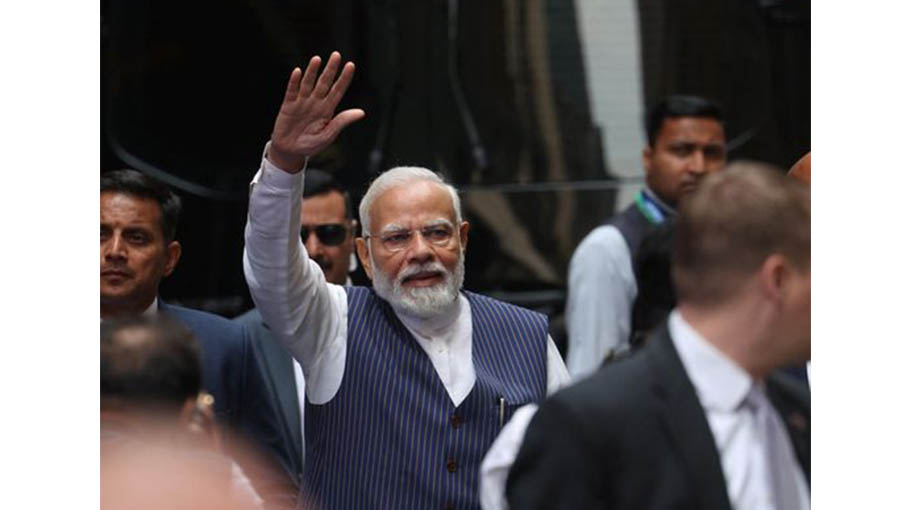Modi’s state visit to America marks a turning point


In my last column, I argued that Indian Prime Minister Narendra Modi’s state visit to the United States was an opportune moment in the history of the world’s two greatest democracies to take their relationship to new heights. Not only defence and technology deals or trade and economic partnership, but principled geostrategic alliances are the way forward.
As Modi himself put it, speaking to the Wall Street Journal, in one of his rare interviews to Western media, there is “unprecedented trust” between the leaders of the two nations.
He is also right in stressing, “We do not see India as supplanting any country. We see this process as India gaining its rightful position in the world. The world today is more interconnected and interdependent than ever before.”
Landed in New York City. Looking forward to the programmes here including interaction with thought leaders and the Yoga Day programme tomorrow, 21st June. pic.twitter.com/6V5gHglLCg
Those in India who feel insecure when India moves closer to the US have no reasons to worry. Rather, we should forsake the “small state” mentality of the past, as well as give up the so-called “non-aligned” Nehruvian fetish of yesteryears.
I say “so-called” advisedly because, for all practically purposes, India was aligned to the Soviet Union during the Cold War just as Pakistan was America’s ally on the other side of our Western border.
In today’s fast-changing, multipolar world order, the time has come to reset our diplomatic and strategic mindset, something both Modi and Extern Affairs Minister, S. Jaishankar have been undertaking, even as this column goes to press.
Optics of a state visit
The fact is that India is too big a country, not only the most populous in the world, with over 1.4 billion people, the world’s fifth largest economy, but also the third largest military spender, to be a satellite state or junior partner to any other state, however powerful.
The US may have been surprised, even dismayed, at India’s reluctance openly to condemn Russia for invading Ukraine, but it was quick to see the bigger picture.
Clearly, an expanded and reconstituted UN
Security Council will go hand in hand with
a stronger Indo-US alliance. Both will
contribute immensely to making the
world a safer and better place
India can be a crucial strategic ally without toeing the US line on all matters. Similarly, those in India, particularly the dog-in-the-manger Left, who are afraid of India’s moving closer to the US, must rest assured that India will never compromise on its strategic independence.
The fact is that more than the optics and ceremonial significance of a state visit, Indo-US ties have never been as closely convergent as now.
Apart from a few sore or sticking points, such as India’s long-standing relationship with Russia, and the US’s own past dealings with some countries considered inimical to India, there is a much greater overlap in mutual interest than in past decades. The US is not only India’s largest trading partner, but also needs India to counterbalance China in the Indo-Pacific.
But, as Modi stressed, peace and tranquillity on our borders are essential; India is committed to good neighbourly relations with China. Indo-China relations must be kept apart from the ramping up of Indo-US partnership. Modi reiterated India’s “core belief in respecting sovereignty and territorial integrity, observing the rule of law and peaceful resolution of differences and disputes.
At the same time,” he emphasised, “India is fully prepared and committed to protect its sovereignty and dignity. All countries should respect international law and the sovereignty of countries.” In a possible aside on the continuing Ukraine conflict, Modi added that disputes between states should be resolved with “diplomacy and dialogue,” not war.
Today, June 21, is international yoga day, a triumph not only of India’s soft power, but also of its civilizational heft. The whole world benefits from the practice of yoga.
Modi will lead a huge public display of yoga at the UN later today. But what is also important is the expansion of the UN Security Council. The five states currently permanent members, US, UK, France, Russia, and China, reflect the old post-World War II world order.
Today, not only India, which is a nuclear power and the world’s most populous state, but Japan, Brazil, South Africa, and possibly Egypt as the world’s largest Arab state, are also fit candidates to represent and balance the different regions and power centres in the world.
Clearly, an expanded and reconstituted UN Security Council will go hand in hand with a stronger Indo-US alliance. Both will contribute immensely to making the world a safer and better place. It is hoped and expected that this will be the real, long-term accomplishment of Modi’s state visit.
Makarand R. Paranjape is a Professor of English at the Jawaharlal Nehru University.
Views are personal.



